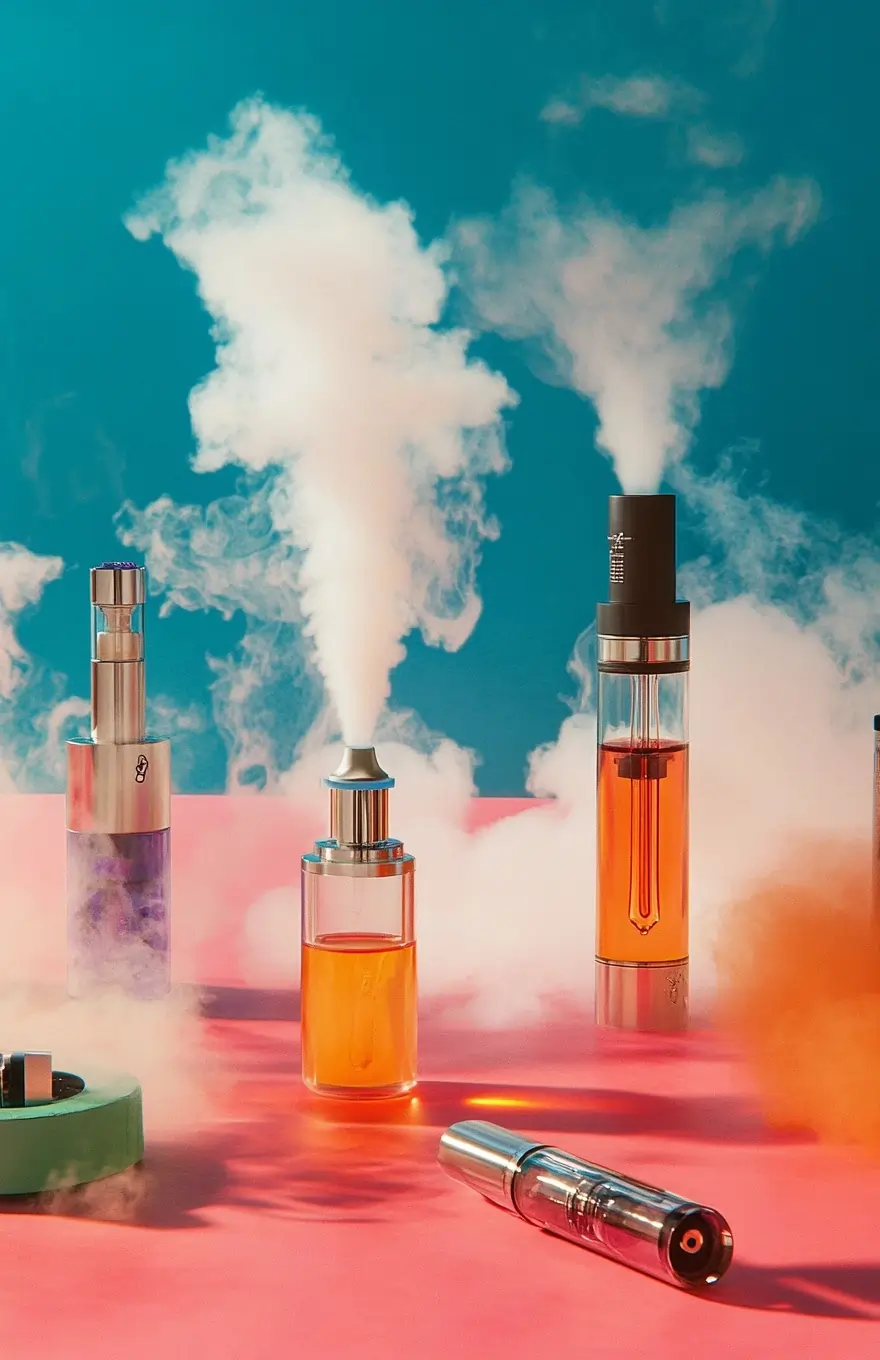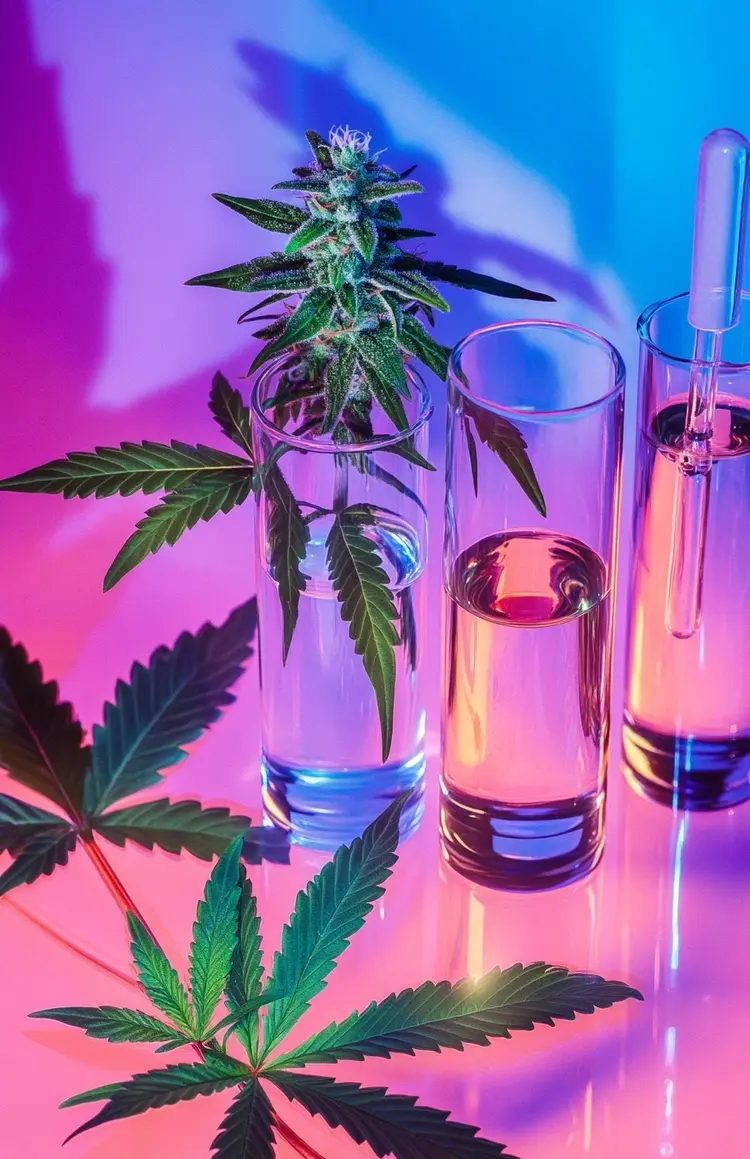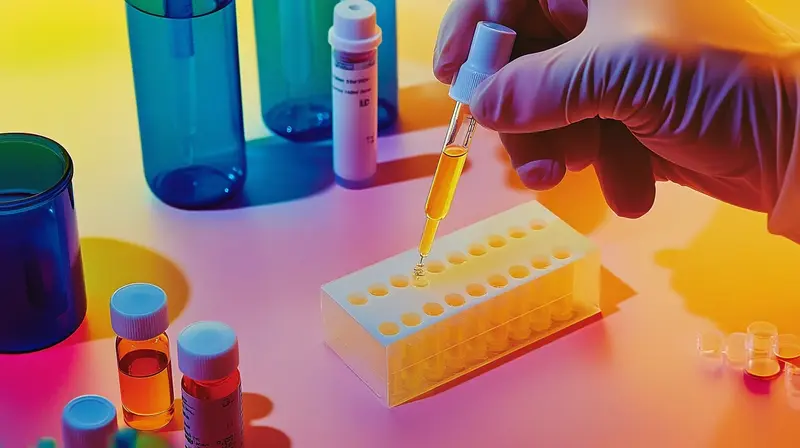

While THC and CBD often steal the spotlight, the THCa vs THCV debate is heating up, shining a light on the untapped potential of these lesser-known cannabinoids. So, what makes them stand out in the ever-evolving cannabis world? Let’s break down their differences, how they’re used, and why they matter in the cannabis world.
THCA, short for tetrahydrocannabinolic acid, is a natural compound found in raw cannabis plants. It’s the acidic precursor to THC, which means it’s what THC starts as before being exposed to heat. When you smoke or vaporize cannabis, heat triggers a process called decarboxylation that turns THCA into THC, the compound responsible for psychoactive effects.
Unlike THC, raw THCA doesn’t cause a “high” because it doesn’t interact with the brain’s cannabinoid receptors the same way. Instead, it’s known for its potential therapeutic benefits. Research suggests it might help with nausea, have neuroprotective properties, and potentially offer anti-inflammatory activity. THCA is most commonly found in live cannabis and raw products, making it popular among those exploring therapeutic benefits.
THCV, or tetrahydrocannabivarin, is another cannabinoid found in the cannabis plant. While it shares some similarities with Delta 9 THC and THCA, it has a different chemical structure that makes it unique. THCV is known for its potential appetite suppression and lighter psychoactive effects when consumed in higher doses.
This compound interacts with cannabinoid receptors in a distinct way, offering potential therapeutic benefits like neuroprotective effects. Unlike THCA, THCV is less common and is usually only found in certain strains. Because of its unique properties and rarity, it’s a hot topic in cannabis research and gaining attention among enthusiasts looking for something different.

THCa and THCv may sound similar, but they’re quite different in how they work and what they offer. From their effects on the body to their benefits, these two cannabinoids provide unique experiences. Let’s see what makes each one stand out.
When it comes to potency, THCa and THCv have their own strengths. THCa, in its raw form, is non-psychoactive and won’t produce mind-altering effects unless it’s heated. THCv, however, can have psychoactive properties, but only at higher doses, making its effects more controlled. These differences come down to their chemical structures and how they interact with the body’s endocannabinoid system.
Raw THCa focuses more on therapeutic benefits like anti-nausea, while THCv is known for appetite suppression and energy regulation. Depending on your goals, either one could be a great choice.
Both THCa and THCv offer a variety of potential benefits, but they work in different ways. Let’s take a closer look at what each cannabinoid can do.
Raw THCa provides therapeutic benefits without causing psychoactive effects. However, when heated or decarboxylized, THCa provides many of the same benefits along with a buzz or high. Here are some highlights:
THCv stands out for its distinct benefits, making it different from other cannabinoids. Here’s what it offers:
THCa and THCv impact the body in different ways. THCa, in its raw form, is non-psychoactive and primarily offers therapeutic effects targeting physical discomfort or nausea. When heated, it turns into THC, which can produce psychoactive effects.
THCv is unique because, at low doses, it’s non-psychoactive and may even counteract THC’s effects. At higher doses, it can produce a stimulating and uplifting experience. These differences make them suitable for various needs.
The legal status of THCa and THCv can vary. THCa is federally legal in the U.S. if the product contains less than 0.3% Delta 9 THC, though some states have stricter rules due to its potential to convert into THC.
THCv is federally legal under the 2018 Farm Bill, but state laws differ. It’s important to check your local laws before purchasing products containing these cannabinoids. As cannabis laws continue to evolve, staying updated is key.
How you consume THCa and THCv can make a big difference in your experience. The right method depends on your personal goals and preferences:
THCa:
THCv:
THCa is widely available in fresh cannabis plants and is often found in tinctures, capsules, and raw products. THCv is rarer, often requiring selective breeding or synthetic production to meet demand. Both are increasingly offered online, but it’s essential to buy from reputable sources, like Hollyweed, to ensure quality. Always review lab reports and customer reviews to ensure the product meets safety and efficacy standards.
THCa tends to be more affordable since it’s abundant in raw cannabis plants. THCv, on the other hand, is pricier due to its rarity and the need for synthetic production or special breeding. Prices also depend on the product type, like edibles, tinctures, or vapes. When choosing between them, consider both your budget and the quality of the product to ensure it meets your needs.
The molecular structures of THCa and THCv explain their differences. THCa has a carboxylic acid group, which makes it non-psychoactive until heated. THCv, however, has a shorter hydrocarbon chain than Delta 9 THC, which contributes to its unique euphoric effects. These structural differences influence how they interact with the endocannabinoid system, giving each cannabinoid its specific benefits and uses.

THCa and THCv might sound similar, but the way they’re made in the cannabis plant is quite different. These two cannabis compounds are formed through unique processes involving specific molecules and enzymes. Here’s how they’re created and what sets them apart.
THCa starts with olivetolic acid and CBGA (cannabigerolic acid). An enzyme called THCa synthase helps convert CBGA into THCa. THCv, on the other hand, is made from a different starting molecule called CBGV-A (cannabigerovarinic acid). Special enzymes convert CBGV-A into THCv.
Unlike THCa, THCv doesn’t need heat to activate, but it’s typically found in much smaller amounts in cannabis plants. To produce enough THCv for products, growers often rely on selective breeding or synthetic production methods.
Hollyweed takes pride in offering high-quality THCa products tailored to meet your needs. From flavorful flower to versatile vapes and concentrates, our range provides something for everyone.
Our THCa flower is perfect for those who enjoy consuming raw cannabis or prefer smoking for quick effects. Known for its non-psychoactive properties in its raw form, THCa flower can transform into THC when heated, providing a range of potential therapeutic benefits. You can enjoy it in various ways, including vaping, smoking, or even adding it to edibles.
Looking for Bulk THCa Flower? Checkout our THCa Wholesale Form!
For a discreet and convenient option, our THCa disposable vapes are a great choice. Perfect for on-the-go use, these ready-to-go vapes provide fast-acting effects and are ideal for consumers seeking a smooth, flavorful experience. Each cartridge combines THCa with other cannabinoids like Delta-8 and HHC to create a balanced effect.
THCa concentrates are perfect for experienced consumers who want a more potent option. They can be dabbed or vaporized for quick and intense effects, making them a great choice for those seeking powerful therapeutic benefits. Concentrates offer the purest form of THCa for a clean and flavorful experience.
Hollyweed’s THCa products are crafted to the highest standards, ensuring quality, potency, and safety. Choose the option that fits your lifestyle and experience the difference!
Finding high-quality THCa and THCv products doesn’t have to be complicated. Knowing what to look for can make a big difference in your experience. Here are some easy tips to help you choose the best options:
THCa and THCv can show up on a drug test, but it depends on how they are consumed. If you’re consuming raw cannabis, THCa is non-psychoactive and may not metabolize into THC, which most tests detect. However, heating THCa or consuming THCv at higher doses could lead to detectable THC metabolites in your system.
THCv and THCa are potent in different ways, depending on how you define potency. THCa is non-psychoactive in its raw form but transforms into THC when heated, delivering psychoactive effects. THCv, on the other hand, can have psychoactive effects at higher doses and is known for its unique appetite suppression properties.
It really depends on what you’re looking for. THCa is great for those who prefer consuming raw cannabis or non-psychoactive options with potential therapeutic benefits. THCv stands out for its energetic effects and potential to suppress appetite, making it a favorite for specific needs.
It can, but not in its raw form. THCa is non-psychoactive, meaning it won’t produce a euphoric buzz unless heated. When converted to THC through decarboxylation (heat), it can create psychoactive effects similar to Delta 9 THC.
Both cannabinoids are generally well-tolerated, but risks depend on individual factors. THCa, when heated, converts to THC and may produce psychoactive effects that some people prefer to avoid. THCv’s appetite suppression and energetic effects may not be ideal for everyone, so it’s best to start with lower doses to see how your body reacts.
THCa and THCv each play unique roles in the cannabis world, offering different benefits for various needs. THCa is great for its potential anti-inflammatory and neuroprotective benefits, especially when used in its raw form. THCv stands out with its ability to suppress appetite and may provide energy at higher doses, making it a good choice for focus or weight management.
If you’re looking to relax your mind and body or enhance overall wellness, both cannabinoids could be helpful. The key is to know their effects and start with high-quality, lab-tested products. Begin with small doses to see what works best for you and adjust as needed. Choose the one that matches your needs and enjoy the unique benefits each has to offer.